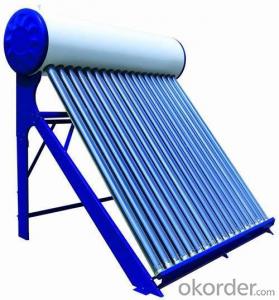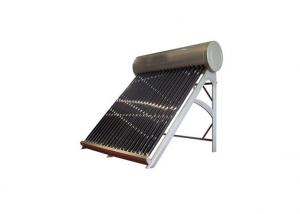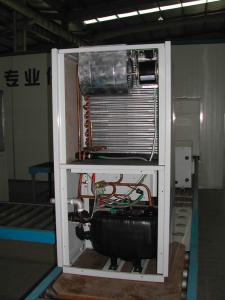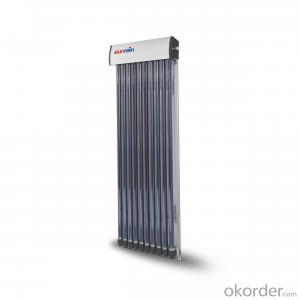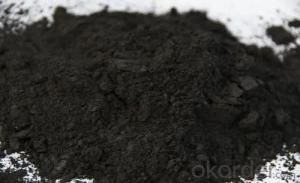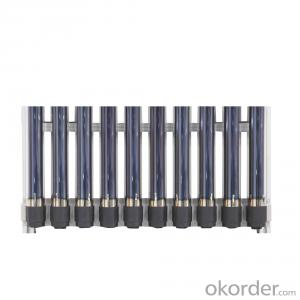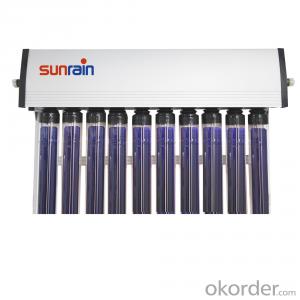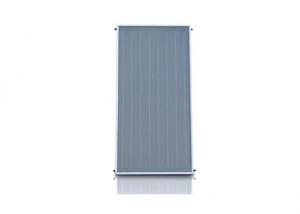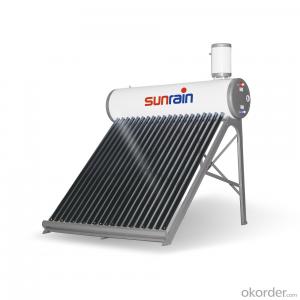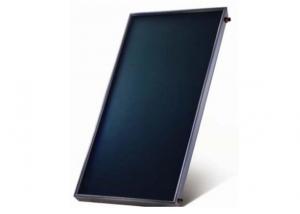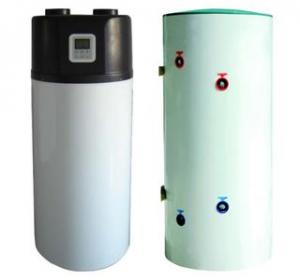Integrated Unpressurized Solar Hot Water Heater
- Loading Port:
- China main port
- Payment Terms:
- TT OR LC
- Min Order Qty:
- 10 set
- Supply Capability:
- 10000 set/month
OKorder Service Pledge
OKorder Financial Service
You Might Also Like
Introduction of Non-Pressure Solar Water Heater:
Non-pressure Solar Heater is one of the most economical solar water heating device with pretty high efficiency at the same time. It consists of hot water storage tank, solar vacuum tubes with mouth plug in storage tank, and bracket supporting tank and tubes.When cold water in evacuated tubes is heated with solar irradiation, as the specific gravities of hot water and cold water are different, hotter water goes upward to storage tank and colder water goes downward to glass tubes. through this continuous circulation, the cold water in storage tank will be gradually heated till sunset.
Solar water heaters working principle
1. The solar collector absorbs solar energy and transmits it to the solar water heater tank through circulation
2. When the temperature of the collector reaches the set value, the controller starts the circulation pump automatically
3. The circulation pump makes heat-conducting liquid circulate automatically
4. The heat-conducting liquid transfers heat to water by lower heat exchanger in the water tank.
5. When the temperature difference between solar collector and heat pipe solar water heaters tank doesn't reach the set value, the circulation pump will be shut automatically
6. In case the temperature of the water tank does not reach Tmax, Electric Heating Element will start to work automatically
Solar water heaters working station component:
1. Operating screen
2. Manometer
3. Pump speed adjust switches
4. Temperature difference circulation pump
5. Flow rate indicator
6. Return circuit connector
7. Safety valve
Solar water heaters specification:
Description | solar water heaters |
Material of out manifold | 0.55mm thickness color steel/ fluorine carbon steel |
Material of inner tank | Food grade 2.0 mm thickness SUS304 stainless steel |
Tank insulating layer | 40mm 45kg/m³ high-density polyurethane foamed |
Inlet and outlet hole | Male G1'' |
Max pressure | 0.6 Mpa |
Solar collector tube | 3.3 Borosilicate glass with N/Al coating |
Thickness of glass tube | 1.6mm |
Vacuum tube tightness | P≤0.005 Pa |
Absorption | as=0.93-0.96 (AM1.5) |
Emission ratio | εh=0.04-0.06 (80C±5C) |
Idle sunning property parameters | Y=220~260m2.C/KW |
Average heat loss coefficient | ULT=0.6~0.7W/(m2.C) |
Bracket: | 2.0mm thickness aluminum alloy |
Tank weight | 75KGS |
Tank size | 560mm Dia x 1810mm Height |
Tank capacity | 300L |
Solar collector | 2pcs 58x1800x15tube solar collector |
Absorber area | 2.811 m² |
Working station | SP116 working station |
Heat exchanger length | Upper:12m, Underside:18m |
Solar water heaters details show:
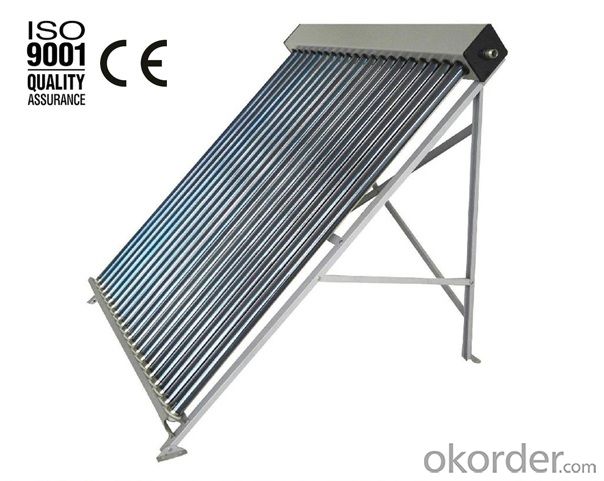
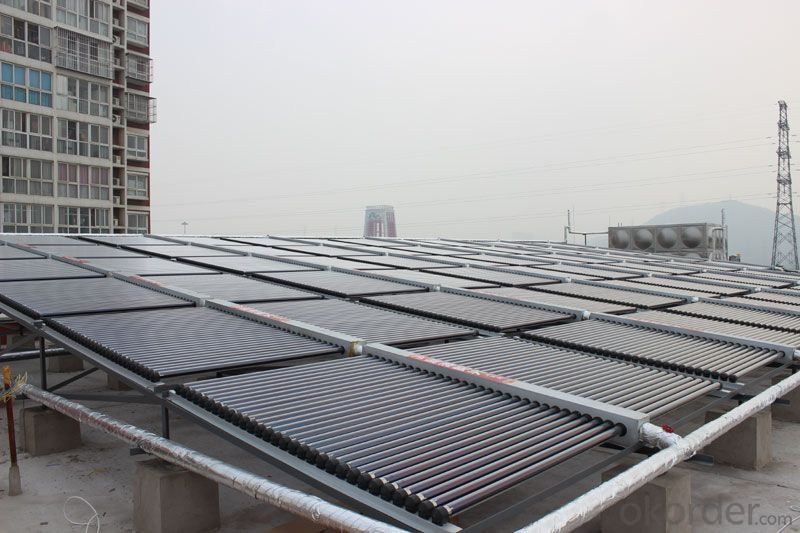
Benefits of this kind of solar water heaters:
1. Prolong the life of your existing water heater
2.Costs less than an electric, gas or oil water heater
3.No maintenance required
4.Lasts longer than a traditional hot water heater
5.Reduce your water heating costs
- Q:Can a solar water heater be used in areas with limited access to building permits?
- Yes, a solar water heater can be used in areas with limited access to building permits. Solar water heaters are typically considered as low-impact and environmentally friendly systems, which may require fewer regulations and permits compared to other conventional heating systems. However, it is important to check the specific regulations and requirements of the area in question to ensure compliance and obtain any necessary approvals before installation.
- Q:Can a solar water heater be used in areas with high temperatures?
- Yes, a solar water heater can be used in areas with high temperatures. In fact, solar water heaters are particularly effective in such areas as they can harness the abundant sunlight to heat water, reducing the reliance on conventional energy sources. The high temperatures enhance the efficiency of the solar collector, allowing for greater heat transfer and faster water heating.
- Q:Can a solar water heater be used in areas with limited access to construction materials?
- Yes, a solar water heater can be used in areas with limited access to construction materials. Solar water heaters are designed to be simple and easy to install, and they can be made using locally available materials such as metal, glass, and insulation. This allows for their construction and installation even in areas where traditional construction materials may be scarce. Additionally, solar water heaters require minimal maintenance and can provide reliable hot water using only the sun's energy, making them a practical and sustainable solution for areas with limited access to construction materials.
- Q:What is the role of a solar controller in a solar water heater system?
- The role of a solar controller in a solar water heater system is to regulate and control the flow of heat transfer fluid between the solar collectors and the storage tank. It monitors the temperature of the fluid, ensuring that the collectors are operating efficiently and not overheating. The controller also manages the circulation pump, activating it when the temperature difference between the collectors and storage tank is sufficient for heat transfer. Additionally, it may have features like freeze protection and temperature display to provide additional functionality and user convenience.
- Q:What are the installation requirements for solar panels used in a solar water heater?
- The installation requirements for solar panels used in a solar water heater may vary depending on the specific system and location. However, there are some general requirements that are common for most installations. Firstly, it is essential to have an unobstructed area with adequate sunlight exposure. The solar panels should ideally be installed on a south-facing roof or an area that receives maximum sunlight throughout the day. Shading from nearby trees, buildings, or other obstructions should be minimized to ensure the panels receive maximum sunlight. The roof or supporting structure on which the solar panels are installed should be strong enough to bear the weight of the panels. Solar panels are quite heavy, and the roof should be able to withstand the additional load. If necessary, reinforcement may be required to ensure the safety and stability of the installation. The solar panels should be securely mounted to the roof or support structure using appropriate mounting equipment. The mounting system should be able to withstand high winds, snow loads, and other environmental factors. It is important to follow the manufacturer's instructions and guidelines for proper installation. In addition to the solar panels, a solar water heater system also requires a storage tank, plumbing connections, and other components. These components should be installed according to the manufacturer's instructions and local building codes. It is advisable to consult a professional installer or a licensed plumber to ensure proper installation and compliance with safety regulations. Furthermore, electrical connections are necessary to connect the solar panels to the water heater system. A qualified electrician should be involved in the installation to ensure proper wiring, grounding, and compliance with electrical codes. Safety precautions should be followed to prevent electric shocks or other electrical hazards. Overall, the installation requirements for solar panels used in a solar water heater involve considerations such as sunlight exposure, structural integrity, proper mounting, plumbing connections, electrical wiring, and adherence to local building codes. It is recommended to consult professionals, such as solar installers, plumbers, and electricians, to ensure a safe and efficient installation.
- Q:Can a solar water heater be used in areas with hard water?
- Yes, a solar water heater can be used in areas with hard water. However, it may require additional maintenance and care to prevent mineral deposits from building up on the solar panels or inside the system. Regular cleaning, descaling, and using water softeners or filters can help mitigate the effects of hard water on the solar water heater's performance.
- Q:Can a solar water heater be used in areas with high levels of saltwater corrosion?
- No, a solar water heater is not recommended for areas with high levels of saltwater corrosion. The saltwater can cause significant damage to the components of the solar water heater, reducing its efficiency and lifespan. It is advisable to explore alternative water heating options that are more resistant to corrosion in such areas.
- Q:Can a solar water heater be used in areas with limited access to nuclear power?
- Indeed, solar water heaters are a viable choice for regions hindered by limited nuclear power availability. By harnessing the power of the sun, these heaters efficiently warm water, negating the necessity for nuclear power or any external energy input. Their environmentally conscious and sustainable nature deems them fitting for usage in areas devoid of nuclear power accessibility. Furthermore, solar water heaters can be effortlessly incorporated into both residential and commercial structures, offering a dependable and economical substitute to conventional water heating techniques.
- Q:How to buy solar water heater to check its quality?
- Usually through the instrument testing, to see if it is in line with national standards. If only by experience to identify, you should pay attention to these aspects. 1: consumers in the purchase of the product must be on the water heater, heat exchanger, pipeline interface and core board factory conducted pressure test and leak check, at the same time on their types and materials and consumer requirements are considered. If you can choose according to their own economic conditions of different prices of products
- Q:Can a solar water heater be used in areas with limited access to government support or policies promoting renewable energy?
- Certainly, areas with limited government support or policies promoting renewable energy can still utilize solar water heaters. These devices are an excellent choice for such locations, as they operate independently of grid electricity and utilize the abundant energy of the sun to provide hot water. Solar water heaters are relatively straightforward and cost-effective technologies that can be easily installed and maintained. They consist of a solar collector that absorbs sunlight to heat water, which is then stored in an insulated tank for later use. This means that individuals or communities in areas without government support can still utilize the power of the sun to satisfy their hot water needs. Additionally, solar water heaters offer significant financial and environmental benefits. They can substantially reduce energy bills and decrease dependence on fossil fuels. Moreover, they can be used in both residential and commercial settings, making them versatile and adaptable to various situations. While government support and policies promoting renewable energy can undoubtedly expedite the adoption of solar water heaters and other renewable energy technologies, they are not essential for their utilization. In areas lacking such support, individuals and communities can still take advantage of the benefits provided by solar water heaters through their own initiative. In conclusion, a solar water heater is a viable option for areas with limited access to government support or policies promoting renewable energy. Its simplicity, cost-effectiveness, and ability to harness solar energy make it a practical and sustainable solution for those seeking alternative energy sources.
1. Manufacturer Overview |
|
|---|---|
| Location | |
| Year Established | |
| Annual Output Value | |
| Main Markets | |
| Company Certifications | |
2. Manufacturer Certificates |
|
|---|---|
| a) Certification Name | |
| Range | |
| Reference | |
| Validity Period | |
3. Manufacturer Capability |
|
|---|---|
| a)Trade Capacity | |
| Nearest Port | |
| Export Percentage | |
| No.of Employees in Trade Department | |
| Language Spoken: | |
| b)Factory Information | |
| Factory Size: | |
| No. of Production Lines | |
| Contract Manufacturing | |
| Product Price Range | |
Send your message to us
Integrated Unpressurized Solar Hot Water Heater
- Loading Port:
- China main port
- Payment Terms:
- TT OR LC
- Min Order Qty:
- 10 set
- Supply Capability:
- 10000 set/month
OKorder Service Pledge
OKorder Financial Service
Similar products
New products
Hot products
Hot Searches
Related keywords
